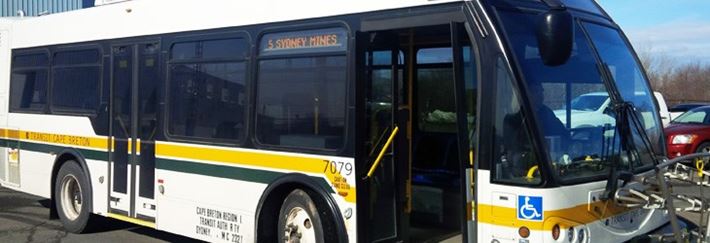The child poverty rate in the Cape Breton Regional Municipality stands at 32.4% (42.7% for those under the age of six).
We're heading into a municipal election and every candidate, whether for council or the Mayor's Office, should be asked, “What is one, concrete thing you would do to combat the problem of poverty in the CBRM?”
And just to get out ahead of this, the answer cannot be, “I would build a $1 billion international container pier,” or “I would open a coal mine,” or “I would attract a major unnamed industry.” The answer has to be something that would improve life immediately, even if only in a small way, for people who live right here, right now.
Let me give you an example: grant the United Way of Cape Breton $40,000 for its pilot transit project.
Lynn McCarron, the organization's executive director, appeared before council in February 2016 and made the case for improving transit to combat poverty. She asked the CBRM to back a pilot program that would subsidize monthly bus passes for low-income residents.
She also plumped for the introduction of smart-card technology, an idea she found in this 2011 Transit System Review (commissioned by the CBRM and then, apparently, thrown under a bus). Smart cards would not only eliminate paper tickets and passes and provide detailed ridership data for the transit system, they could be used for a variety of other purposes, some of which she outlines in her presentation.
Bulk-buying bus passes (an experiment the Halifax Regional Municipality is preparing to try, according to Erica Butler in—paywall warning—the Halifax Examiner) not only helps pass-holders, it puts money into the transit system, achieving that win/win result so beloved of politicians running for re-election.
In other words, it's worth a try, right? And luckily, I know exactly where to find that $40,000.
CBC: Nova Scotia municipalities spend $600K on 2 conferences
The CBC is reporting today that the CBRM spent $39,754 (oh, let's call it $40,000) to send representatives to two Federation of Canadian Municipalities (FCM) meetings in Vancouver in 2013 and Niagara Falls in 2014.
"I know it's a tough topic," said CBRM councillor George MacDonald, who went to both Vancouver and Niagara meetings.
“We're strapped. We have a deficit, so it's an easy question to ask."
But MacDonald said attending FCM meetings is "imperative," to learn how other communities are coping with similar challenges.
"When we were in Vancouver, we looked at Prince Rupert. They had problems and now have a booming port. So that's why we have to go."
Does anybody actually buy that? The “challenge” facing the CBRM—the decline of its industrial base and the out-migration and unemployment that has followed—goes back to the 1960s. If solutions to our problems were to be found at FCM meetings (which, by the way, have been happening since 1901) wouldn't some have been found by now? MacDonald went to Vancouver three years ago; are we to believe he learned the secret to turning Sydney into a booming port but has chosen to keep it to himself? (Does he sit alone at night like Monty Burns, chortling at the thought of the economic development he could spark if only he cared to?)
If our municipal leaders are really looking for solutions to our problems, why don't they start on the CBRM website where they can read some of the studies they themselves commissioned? Here's a test question I'm going to ask any candidate for office unlucky enough to knock on my door this fall:
You are looking for solutions to the problem of transit in the CBRM, do you:
a) Fly to a Federation of Canadian Municipalities meeting in Vancouver on the off chance that, while grazing the brunch buffet, you bump into the mayor of a similar-sized city who has found a brilliant solution to his transit problems;
b) Read the transit review you actually commissioned in 2011 and see if any of its recommendations are worth implementing.
(Note to pols: if you don't realize you should at least tell me you'd pick option "b," you probably shouldn't be running for office).
Here's what I propose: a one-year moratorium on travel by the mayor and council. We'll replace their plane tickets with Skype Out accounts, allowing them to call their municipal counterparts anywhere in the world and say, “How are you coping with your challenges?” Hell, we could even spring for a subscription to Modern Municipal Challenges magazine (which I'm almost positive is a thing). We'll pay for them to attend next year's "Growing the Creative Economy" conference (held here in the CBRM) and even give them bus fare to get there; we'll buy them popcorn and make sure they're seated comfortably as they watch any and all of the FCM presentations available on the organization's website. In short, we'll drag them into the 21st century, where "long-distance communication" is a problem we have actually solved.
We'll save about $40,000 from the mayor's annual travel budget alone—not including the travel he's doing on the Port of Sydney dime, the cost of which we don't know because shut your saucy mouth. If we also eliminate that ridiculous weekly travel allowance which allows those councilors who take it (and not all do) to claim $140 a week without the slightest whiff of proof they've traveled anywhere, we could add a few more thousand to our pool of funds.
And then we'll take the money and we'll put it into the United Way's transit pilot project because at least that way we can say we are trying to make things better for people in the CBRM.
No offense George, but that is the only "imperative" we face.





9
Log In or Sign Up to add a comment.- 1
arrow-eseek-e1 - 5 of 5 itemsFacebook Comments